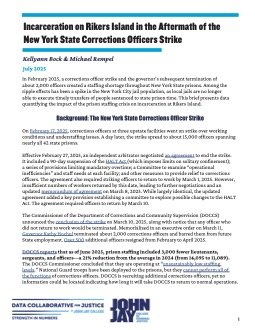By Jennifer Ferone, Bryn Herrschaft, Kate Jassin, Cecilia Low-Weiner, Aimee Ouellet
Findings from a multiyear process evaluation of New York State legislation aimed at facilitating pretrial release and minimizing the use of cash bonds. Includes recommendations and lessons learned for future reform efforts both in and out of New York. The inequities inherent in this country’s criminal legal system have been well-documented. Research and evidence repeatedly show that socioeconomic circumstances affect how people fare at all points, with those who are economically disadvantaged and Black, Indigenous, and People of Color (BIPOC) faring disproportionately worse, such as higher rates of arrest and incarceration. The pretrial period—which is after a person is arrested and charged but before they have been convicted of any crime—is no exception to this trend. Disparities at this stage are particularly prevalent, having been exacerbated by the ever-expanding use of cash bail and pretrial detention across jurisdictions in recent decades. This has long-lasting implications: even one day in jail can lead to exposure to violence while incarcerated, and loss of housing and employment after release.1 In the past, efforts to reduce the harm caused by cash bail were often tied to particular system leaders making changes to administrative policies under their control (e.g., prosecutors not charging individuals with certain low-level offenses). In recent years, however, some states have taken up broader legislative reforms aiming to transform the system on a much larger scale; specifically, many have moved to eliminate or substantially reduce the use of cash bail as a major factor in determining when and for whom pretrial detention is used. In 2019, New York became one of these states, with the passage of the Criminal Justice Reform Act (Act) in April of that year (with reforms taking effect on January 1, 2020). The Act, fueled by increasingly abhorrent conditions at the Rikers Island jail complex in New York City (NYC), was hailed as one of the most ambitious bail reform packages in the country. The comprehensive package of reforms was driven by the recognition of New York's systemic problems and the need to address them through an effort that was equally broad in scope and scale. At its core, the Act aimed to facilitate a presumption of non-financial release to avoid the deleterious and inequitably distributed effects of pretrial detention. The New York State government (NYS) understood, however, that to effectively and safely shift away from incarceration as a primary system response— and to create a decision-making foundation that was not dependent on financial resources—a variety of local criminal legal processes beyond the bail decision had to shift as well. To that end, the legislation included provisions in other related areas. More specifically, the legislation aimed to reduce systemic inequities and harms through a comprehensive approach that incorporated significant changes to policy and practice in four key areas of pretrial decision-making (continued)
New York: CUNY Institute for State & Local Governance 2023. 55p.





